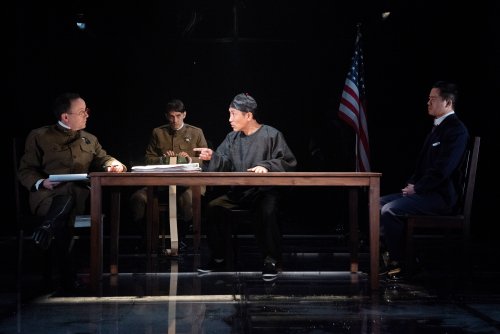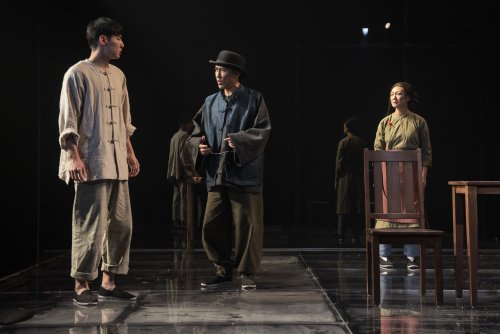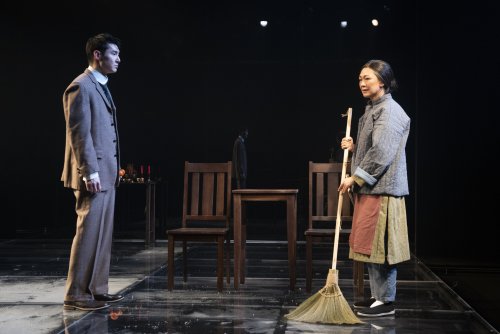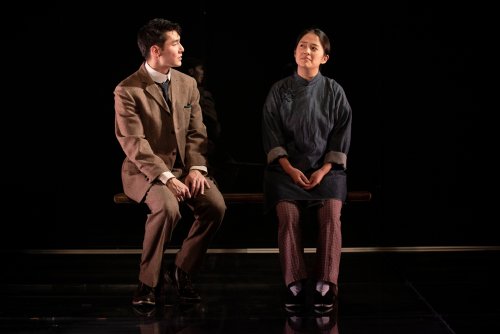The Far Country
As much as history allows, playwright Lloyd Suh brings to life the painful past of Chinese immigration to the United States.

Christopher Liam Moore, Ben Chase, Jinn S. Kim and Whit K. Lee in a scene from Lloyd Suh’s “The Far Country” (Photo credit: Ahron R. Foster)
In 1909, the year Lloyd Suh’s The Far Country begins, a depressing constellation of racist laws denied Chinese immigrants to the United States a path to naturalization, but because of the Fourteenth Amendment to the U.S. Constitution, which guaranteed birthright citizenship, their native-born children automatically became Americans. While historically humanizing this painful paradox, Suh also refuses to sentimentalize the past. That means both accepting the fact that not every response to systemic discrimination is morally upright and, more dishearteningly, that the cost of bigotry is often history itself.
The play opens in an interrogation room, where it soon becomes clear that the outwardly obsequious Gee (Jinn S. Kim), a middle-aged Chinese man summoned to prove his American birth, is a much more complicated figure than suggested by his deferential statements in broken English to a grimly insensate immigration official (Christopher Liam Moore). Claiming that all of his documentation was destroyed in the horrific 1906 San Francisco earthquake, Gee not only expresses himself far better when speaking in his first language to a furtively advice-giving Chinese interpreter (Whit K. Lee), his demeanor also shifts to self-confidence bordering on arrogance when addressing this friendlier face. To be sure, Gee is still a victim of institutional racism, but there’s a strong hint he’s not a passive one.

Eric Yang, Jinn S. Kim and Amy Kim Waschke in in a scene from Lloyd Suh’s “The Far Country” (Photo credit: Ahron R. Foster)
Like The Chinese Lady, a previous Suh play, The Far Country is about an imagined identity constructed through a white imperial gaze that is, to some degree, internalized by the gazed at for survival. But, whereas the former’s eponymous Afong Moy–possibly, the earliest female Chinese immigrant to the U.S.– is cruelly transformed into a traveling museum curiosity for the sake of gawking American spectators, Gee has the opportunity for a measure of illicit agency, provided he can establish a birthright to it. Spoiler alert: he does, and please read no further if you’re already annoyed at me for revealing that much of the plot.
A less ambitious playwright might have explored the monstrous ramifications of the 1882 Chinese Exclusion Act and other callous legal hurdles aligned against a wholly sympathetic Gee, but after that interrogation room in San Francisco quickly transforms into a poor home in China’s Guangdong Province, we’re confronted with Gee’s inhumane response to his own inhumane treatment. To Gee, U.S. citizenship and the unlikely chance at prosperity it offers isn’t a gift; it’s a commodity, one that he paid dearly to attain and will charge a lot more to share. The wretched targets of Gee’s warped American Dream are a widow (Amy Kim Waschke) and her son Moon Gyet (Eric Yang). After a harrowing negotiation with the achingly broken woman, Gee brings Gyet to America, posing as the teenager’s father in exchange for his indentured servitude.

But to earn that exploitation, Gyet first must convince another immigration official (Ben Chase) that he is Gee’s son. This relentless browbeating eventually segues into a beautifully poetic and loving tribute to every Chinese person once confined on that strangely verdant speck of land in San Francisco Bay known unironically as Angel Island. That it would become for many of them a place of lost hope is reinforced by Jiyoun Chang’s sepulchral lighting and the sudden realization that Clint Ramos’s metaphoric set includes a surprising barrier between the audience and the characters. In effect, it’s an island, too.
All of the above occurs prior to the intermission and, if The Far Country has a shortcoming, it’s that the second half feels like a sequel to what came before rather than a continuation of the same play, despite the sensitive efforts of director Eric Ting to emotionally stitch everything together. In part, that’s because characters disappear entirely after Suh’s story resumes, though the more salient cause is the relatively late introduction of Yuen (Shannon Tyo), a desperate, but still strong-willed, young woman to whom Gyet proposes marriage after returning to China with his U.S. citizenship, essentially replicating Gee’s offer to him with an even more intimate bond.

Eric Yang and Amy Kim Waschke in in a scene from Lloyd Suh’s “The Far Country” (Photo credit: Ahron R. Foster)
Tyo portrayed Afong Moy in The Chinese Lady, and she again adds layers of depth to a character whose life is severely circumscribed. But that becomes a peculiar strength–or problem–in The Far Country, since the actor seems to have more to say about Yuen than a playwright whose ending requires her to be a collection of emotional, physical, and symbolic burdens. Like Tyo, we know there’s more to Yuen than that. Still, to be fair, The Far Country itself holds the answer to this criticism, since, at its heart, the play is a lament for the personal and cultural histories America’s melting pot consumed in its flame.
The Far Country (through January 1, 2023)
Atlantic Theater Company
Linda Gross Theater, 336 West 20th Street, in Manhattan
For tickets, call 646-989-7996 or visit http://www.atlantictheater.org
Running time: two hours including one intermission






Leave a comment